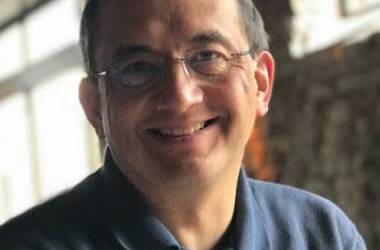Wittenborg Online News!
How Not to Get "Cancelled" as a Company in Post-COVID World
How Not to Get "Cancelled" as a Company in Post-COVID World
How Not to Get "Cancelled" as a Company in Post-COVID World
https://www.wittenborg.eu/how-not-get-cancelled-company-post-covid-world.htm
Guest Lecture: IBM Associate Partner, Jerry Stam, on How COVID-19 Changed Business for Good
Exactly 18 months after delivering his last guest lecture at Wittenborg University of Applied Sciences, Jerry Stam – associate partner of IBM Global Business Services – was back in front of a classroom this week, finding the teaching experience quite different from how he left it. Where last time he stood in front of a full classroom, this time he had to manage both online students and those who attended his classes in person, fielding questions from both groups.
Fittingly, Stam’s lecture revolved around how the impact of COVID-19 has changed the business sector and accelerated digital opportunities for manufacturers and retailers.
Stam has been working in the sector for 25 years – most of the time as a consultant for retail companies. IBM, a multinational technology corporation, invented the automated teller machine (ATM), the floppy disk, the hard disk drive, the magnetic strip card, the SQL programming language, the UPC barcode and dynamic random-access memory (DRAM), but among the general public is more well-known for its personal computer business although it shed its focus more than 20 years ago already.
Stam said in many ways things are back to “normal”. “I did my last physical lecture on 13 March in 2020 and, the day after, everything was closed down. The corona measures did have a lot of impact but over time the impact of those measures has disappeared. For instance, this morning I read that CO2 emissions are now back to pre-COVID levels in the Netherlands. Basic business has returned to normal. On the other hand, a lot of things have changed.
“I have not been to my office for a year and a half. IBM thinks the corona numbers are still too high in the Netherlands and believes it is not safe for its employees or its clients to return to the office. One of the nice things about working from home is that I don’t have to drive so much. I am not driving 40-50,000 km a year anymore and that saves me a lot of time. I am now much less stressed and have more peace of mind. When I woke up at 6 a.m. this morning, I realised for the past year and a half I have only had to wake up that early for a business appointment less than five times. I read that the government is looking at ways to make hybrid working more permanent and among my friends that is definitely something they want to keep doing.”
Stam said among his fashion clients sales for formal clothes has plummeted and been replaced by a demand for more casual clothing. “We stream more TV than we used to and streaming services like Disney had to adapt the income model. Home deliveries of groceries have also grown. Companies who did well were those who moved quickly, integrated digital technology and who were able to find the right people for their staff.”
Stam also said automation is something that cannot be underestimated. He said he believes that it is not good enough to just give customers a physical experience or just a digital experience. “I truly believe you have to do both. Find a way to link the physical and the digital in getting goods and services to customers.”
He said some of the things that companies should focus on for the future is using data correctly and tailoring goods and services to their clients’ needs, as well as establishing “eco-systems” with other companies that have similar interests. Companies should also focus on sustainability and diversity (inclusion) if they want to survive because, according to Stam, this will become even more important in the future. “If you don’t do it properly, you will be ‘cancelled’ to use a popular modern term.”
WUP 22/9/2021
by Anesca Smith
©WUAS Press
660 words